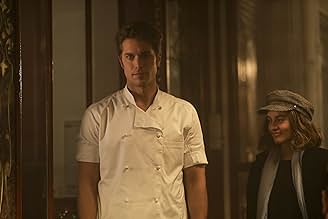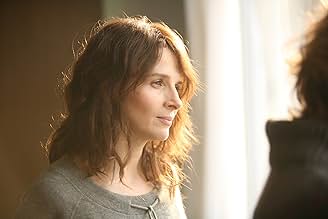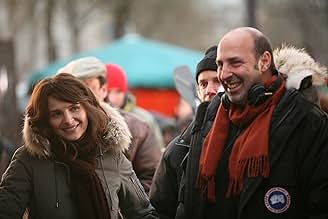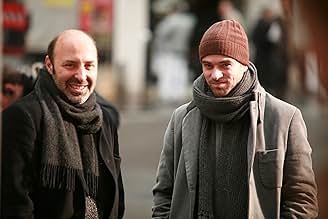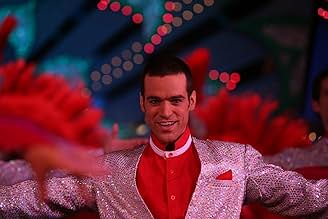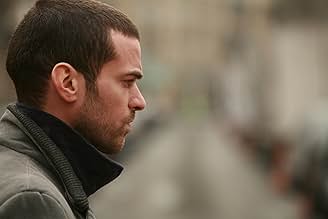AVALIAÇÃO DA IMDb
6,8/10
13 mil
SUA AVALIAÇÃO
Adicionar um enredo no seu idiomaA ex-dancer has a heart problem and even with a transplant, he may still only have a few months to live. Time's spent looking at people/life in Paris from his balcony. His single mom sister ... Ler tudoA ex-dancer has a heart problem and even with a transplant, he may still only have a few months to live. Time's spent looking at people/life in Paris from his balcony. His single mom sister moves in with her 3 kids to look after him.A ex-dancer has a heart problem and even with a transplant, he may still only have a few months to live. Time's spent looking at people/life in Paris from his balcony. His single mom sister moves in with her 3 kids to look after him.
- Prêmios
- 4 indicações no total
Avaliações em destaque
Paris is a kaleidoscopic view of that great City of Light inhabited with a variety of individuals each of whom is consumed with life and love and living and dying. Cédric Klapisch has written and directed this richly populated canvas as a background of a tender story of a Moulin Rouge male dancer Pierre (Romain Duris) who is diagnosed with a terminal heart disease requiring transplantation if he is to survive. But in the end the many characters introduced in 'incidental stories' have become so interesting that, instead of providing simply a background for Pierre's portrait, they become an integral part of the drama as well as indelibly stamped on the viewer's mind.
Pierre has kept his illness secret, yet when faced with the dire concept of a transplant he confides in his sister Élise (Juliette Binoche), a single mother of three, who takes him in to fill his boring days of self confinement. There is a palpable magic between the two as Élise attempts to bring Pierre out into the world of hope and of living. Incidental to her life are trips to the market where she observes the lives of the grocers and discovers their private lifestyles, information shared freely with the viewer. A Parisian North African communicates with his brother at home with a postcard of Paris, seducing the brother to brave all odds to come to the city. We also meet a jaded art historian Roland Verneuil (Fabrice Luchini) whose father has just died, an event that devastates his emotional brother Philippe (François Cluzet): Roland proceeds to have an affair with a student but his physical awakening is abruptly altered by the realities of Parisian life while Philippe progresses through his seemingly mundane existence toward a surprise ending. The grocers seek adventures with a group of girls among whom is the ex-wife of one of the men and in the process we observe the varying reactions of interpersonal relationships tested away from the eyes of group participation. All of these stories are white noise to Pierre's situation, and though Élise is able to make Pierre 'dance again' at a party of his fellow dancers she organizes, in the end Pierre is left to care for Élise's children while Élise finally opens her frozen heart to a new romance. At this point Pierre receives the inevitable telephone call that a transplant is ready, and as he proceeds to the hospital he opens his mind to the beauties of Paris. Some of the vignettes we have observed are completed while most simply continue - just like life in the glorious city so often considered the city of love.
All of the many roles are enacted by gifted actors, the cinematography offers us a different view of Paris than that of postcards and travel brochures, and the musical score ranges from popular music to the haunting 'Gnossiemme No. 1' of Erik Satie which is Pierre's theme music. At times the viewer feels lost in the complex overlay of the many stories being told, but settling back in a chair and just absorbing the film results in an evening of Parisian intoxication.
Grady Harp
Pierre has kept his illness secret, yet when faced with the dire concept of a transplant he confides in his sister Élise (Juliette Binoche), a single mother of three, who takes him in to fill his boring days of self confinement. There is a palpable magic between the two as Élise attempts to bring Pierre out into the world of hope and of living. Incidental to her life are trips to the market where she observes the lives of the grocers and discovers their private lifestyles, information shared freely with the viewer. A Parisian North African communicates with his brother at home with a postcard of Paris, seducing the brother to brave all odds to come to the city. We also meet a jaded art historian Roland Verneuil (Fabrice Luchini) whose father has just died, an event that devastates his emotional brother Philippe (François Cluzet): Roland proceeds to have an affair with a student but his physical awakening is abruptly altered by the realities of Parisian life while Philippe progresses through his seemingly mundane existence toward a surprise ending. The grocers seek adventures with a group of girls among whom is the ex-wife of one of the men and in the process we observe the varying reactions of interpersonal relationships tested away from the eyes of group participation. All of these stories are white noise to Pierre's situation, and though Élise is able to make Pierre 'dance again' at a party of his fellow dancers she organizes, in the end Pierre is left to care for Élise's children while Élise finally opens her frozen heart to a new romance. At this point Pierre receives the inevitable telephone call that a transplant is ready, and as he proceeds to the hospital he opens his mind to the beauties of Paris. Some of the vignettes we have observed are completed while most simply continue - just like life in the glorious city so often considered the city of love.
All of the many roles are enacted by gifted actors, the cinematography offers us a different view of Paris than that of postcards and travel brochures, and the musical score ranges from popular music to the haunting 'Gnossiemme No. 1' of Erik Satie which is Pierre's theme music. At times the viewer feels lost in the complex overlay of the many stories being told, but settling back in a chair and just absorbing the film results in an evening of Parisian intoxication.
Grady Harp
I saw this flick yesterday, and I have to say that I loved it. I am a big fan of Klapisch earlier work( Le peril jeune, Peut etre, chacun cherche son chat,...), but I am yet to see Russian dolls and the Spanish apartment.
I have found this movie in line with the other movies. Not frankly funny, but not only depressing. I thought that all characters are driven by one main emotion, which categorises them into the different stereotypes of Parisians: The intellectual, the artist, the grocer, etc. I have found hard to identify to only one, but rather you can connect with all of them at the same time. I have found out that all of the characters are, in fact, Paris, and I loved the movie for it. Klapisch is a great director and has always been able to capture a lot of complex emotions on camera. I have to say that he did it again in this opus.
His big talent is that he is able to make us reflect on our own lives through trying to understand his characters, and I guess that is why some people did not particularly like this movie as they were forced to have an inside look, but personally, I find it a great exercise.
The photography, avoiding clichés, is great and shows a different side of Paris. It is showing the Paris where people live, and not particularly where people holiday in.
All in all, a great performance by the whole cast and crew. Thanks again mister Klapisch!!!
I have found this movie in line with the other movies. Not frankly funny, but not only depressing. I thought that all characters are driven by one main emotion, which categorises them into the different stereotypes of Parisians: The intellectual, the artist, the grocer, etc. I have found hard to identify to only one, but rather you can connect with all of them at the same time. I have found out that all of the characters are, in fact, Paris, and I loved the movie for it. Klapisch is a great director and has always been able to capture a lot of complex emotions on camera. I have to say that he did it again in this opus.
His big talent is that he is able to make us reflect on our own lives through trying to understand his characters, and I guess that is why some people did not particularly like this movie as they were forced to have an inside look, but personally, I find it a great exercise.
The photography, avoiding clichés, is great and shows a different side of Paris. It is showing the Paris where people live, and not particularly where people holiday in.
All in all, a great performance by the whole cast and crew. Thanks again mister Klapisch!!!
I was really looking forward to see this film for different reasons: The trailer made it look really heart filling, Juliet Binoche and basically because I love French cinema. So I finally got to do so, but man was I disappointed.
It wasn't utterly bad, but basically, for me, it just didn't grab me at any point. Everything and everyone (Each character) seemed so dry, so inexpressive, things would happen and they'd all be like "OH... o.k" and at moments they even seemed to contradict them self's. I don't know, I've seen lots of movies where each characters story is intertwined and some are good, some suck.
I've seen it in American, Italian, French, German and even Spanish cinema, so that kind of story telling is not unique in it self anymore and because of that, it's harder to do it, and I think that in this case, seeing how non of the stories needed the other to exist, none of them really coexisted as one and there fore there was no reason to tell them all in the same piece, well it simply wasn't the best of movies, again it doesn't utterly suck, it just isn't as good as it could have been.
It wasn't utterly bad, but basically, for me, it just didn't grab me at any point. Everything and everyone (Each character) seemed so dry, so inexpressive, things would happen and they'd all be like "OH... o.k" and at moments they even seemed to contradict them self's. I don't know, I've seen lots of movies where each characters story is intertwined and some are good, some suck.
I've seen it in American, Italian, French, German and even Spanish cinema, so that kind of story telling is not unique in it self anymore and because of that, it's harder to do it, and I think that in this case, seeing how non of the stories needed the other to exist, none of them really coexisted as one and there fore there was no reason to tell them all in the same piece, well it simply wasn't the best of movies, again it doesn't utterly suck, it just isn't as good as it could have been.
I saw this film on an airplane to Paris. At first I didn't pay too much attention as I was also reading a book as the same time, and simply use the film as a background to practice my French listening (the film is in French with English subtitle). But as the film developed, I became more and more intrigued, and finally dropped my book reading completely to watch the film.
The plot is very well conceived, and a nice thread is used to connect the lives of several groups of people living in Paris to show aspects of their lives. I admit there are many characters not fully developed, but they still feel very alive and real. An intelligent viewer would be able to follow the diverse characters and get a sense of real life stories depicted here. (Indeed this is not a feel good story, but instead feels very real.)
After finishing the film, I went back to the earlier parts I missed and finally connect the ends to a whole pictures. I recommend to watch twice if you didn't follow the diverse characters and threads at the first time.
The plot is very well conceived, and a nice thread is used to connect the lives of several groups of people living in Paris to show aspects of their lives. I admit there are many characters not fully developed, but they still feel very alive and real. An intelligent viewer would be able to follow the diverse characters and get a sense of real life stories depicted here. (Indeed this is not a feel good story, but instead feels very real.)
After finishing the film, I went back to the earlier parts I missed and finally connect the ends to a whole pictures. I recommend to watch twice if you didn't follow the diverse characters and threads at the first time.
The movie is mostly made of vignettes following several characters, loosely interconnected in the city of Paris. Sounds familiar. To be honest, I've grown tired of the many dramas borrowing that formula. It's become an epidemic, especially since Magnolia. And so, I did not expect to enjoy Paris all that much. But I loved it and it moved me by its stripped down, sincere approach.
Director and writer Cédric Klapisch, unlike several of his contemporaries, did not feel the need to employ convoluted means to link these characters, or end the movie on some sort of unifying, highly artificial bang. Klapish wisely elects to concentrate on building strong characters. He succeeds, so much so that it becomes easy for him to create simple, believable story lines for them. The real link between them? They are fallible, restless, tentative, longing... in other words, they are human.
There's a large cast here and Klepish mostly concentrates on a few of them. Many of the smaller parts are actually as intriguing as the bigger roles and I caught myself wondering what would happen to those characters. But Klapisch stays the course and ends the movie much like it began. A lot is left unresolved, much like life. No Hollywood ending here but I could certainly have followed those characters for another hour if need be.
A beautiful, stripped down story but enough subtext and genuine quality to make for a great and lasting movie experience.
Director and writer Cédric Klapisch, unlike several of his contemporaries, did not feel the need to employ convoluted means to link these characters, or end the movie on some sort of unifying, highly artificial bang. Klapish wisely elects to concentrate on building strong characters. He succeeds, so much so that it becomes easy for him to create simple, believable story lines for them. The real link between them? They are fallible, restless, tentative, longing... in other words, they are human.
There's a large cast here and Klepish mostly concentrates on a few of them. Many of the smaller parts are actually as intriguing as the bigger roles and I caught myself wondering what would happen to those characters. But Klapisch stays the course and ends the movie much like it began. A lot is left unresolved, much like life. No Hollywood ending here but I could certainly have followed those characters for another hour if need be.
A beautiful, stripped down story but enough subtext and genuine quality to make for a great and lasting movie experience.
Você sabia?
- CuriosidadesAs end credits conclude, the choreographed dance show with Pierre shown earlier has a brief repeat.
- Erros de gravaçãoWhen the shop-owner of the bakery sell a baguette she asks for 80 cent, doesn't register it in the till, which has the figures 0,00 than it changes to 0,78 than back to 0,00 again.
- Trilhas sonorasMunivers de Paris
Written by Robert Burke (as R. Burke) and Loïc Dury (as L. Dury)
Performed by Kraked Unit
Universal Music Publishing
MGB / Kraked - ce qui me meut production
Principais escolhas
Faça login para avaliar e ver a lista de recomendações personalizadas
- How long is Paris?Fornecido pela Alexa
Detalhes
- Data de lançamento
- País de origem
- Central de atendimento oficial
- Idioma
- Também conhecido como
- Париж
- Locações de filme
- Empresas de produção
- Consulte mais créditos da empresa na IMDbPro
Bilheteria
- Orçamento
- US$ 12.000.000 (estimativa)
- Faturamento bruto nos EUA e Canadá
- US$ 1.010.194
- Fim de semana de estreia nos EUA e Canadá
- US$ 46.518
- 20 de set. de 2009
- Faturamento bruto mundial
- US$ 23.328.518
- Tempo de duração2 horas 10 minutos
- Cor
- Mixagem de som
- Proporção
- 2.35 : 1
Contribua para esta página
Sugerir uma alteração ou adicionar conteúdo ausente



